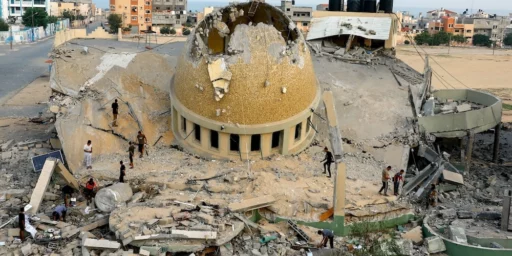Lawfare Amid Warfare
I have referred many times over the years to a 1992 Parameters piece written by then-Colonel Charles J. Dunlap, “The Origins of the American Military Coup of 2012.” It was an instant classic and its lessons remain as important as ever.
I had presumed Dunlap had long since retired but he has been promoted to Major General and is the Air Force’s Deputy Judge Advocate General. I discovered this because he published a piece in yesterday’s Washington Times entitled, “Lawfare Amid Warfare,” arguing that we are giving our enemies an advantage by setting rules of engagement to protect civilians that go well beyond the requirements of international law.
Of course, it is not illegal to establish a policy of “zero tolerance” of civilian casualties even though the law does not require it. Doing so, however, creates unnecessary and often counterproductive results. Among other things, the unrealistic and unachievable expectations produced stimulate a sense of betrayal when such casualties occur, and — despite all efforts — they will always occur in war.
Moreover, foreclosing an attack simply because of civilians in the area may, ironically, condemn many more innocents to be victimized in a future rampage of gunfire, improvised explosive devices or suicide bombing by the terrorists that escape. Though excessive civilian losses must always be avoided, it may very well be more humane approach to kill bad guys when the opportunity presents itself even though some civilian losses may also occur.
Establishing a paradigm of “zero tolerance” for casualties may well come back to haunt us in yet another way. Specifically, it encourages the enemy to do exactly what we do not want them to do: surround themselves with innocent civilians so as to virtually immunize themselves from attack. It creates a sanctuary that the bad guys are not entitled to enjoy, and sends them exactly the wrong message.
He’s right, of course, that war requires making hard choices and that collateral damage may be the least bad option in many cases. At the same time, though, while correctly assessing the politics of failing to live up to unrealistic policies, he seems to ignore the politics of the alternative. The bottom line is that, whatever international law might allow, any innocent casualties in a counterinsurgency – counterterrorist – counterguerrilla – stability and security operation presents the enemy with a propaganda advantage.
Perhaps because he is an Air Force officer, it seems not to occur to General Dunlap that we can simultaneously “kill bad guys when the opportunity presents itself” and protect innocents by choosing a means of attack other than an air strike. Sending in a commando team can achieve both ends, owing to the more precise nature of that attack. Obviously, commandos are also more vulnerable than bomber pilots. But, as Michael Walzer and others have argued, soldiers have a duty to protect innocent lives even though it means accepting greater personal risks.
Air power, including missile strikes, are oftentimes much more effective than ground attacks. Certainly, countless thousand American soldiers and Marines lived to fight another day because of the invaluable contribution made by military aviation. That said, it has little application in COIN/SASO, where the target set is almost invariably tiny and surrounded by noncombatants.






But, as Michael Walzer and others have argued, soldiers have a duty to protect innocent lives even though it means accepting greater personal risks.
I am delighted to see this arguement in print. I have long felt this to be the case, but having served in the Navy could never be certain of it.
The practice of calling in air strikes when we see insurgents run into a set of buildings and then later finding out that the buildings were full of non-combatants has just seemed wrong to me.
Imagine the sense of betrayal that would be produced if we just went around bombing buildings/areas regardless of the civilian casualties that may come about. By having a “zero tolerance” (I don’t believe the policy is really zero tolerance) we definitely cause fewer civilian casualties and most likely save more military lives in the long run.
Wrong. Wars are for winning. If you don’t have the stomach to do what needs to be done then don’t start one. Our failure to be sufficiently aggressive in Iraq is the reason for our failures. No one “likes” civilian casualties but it didn’t deter us in WW II. If the Iraqi populace realized that letting the bad guys hang around might get them killed they would cooperate more.
Ah, so we have dan, another brave internet warrior who desires the deaths of innocent civilians to prove our toughness.
This is the current right wing excuse meme for why we are losing in Iraq: America doesn’t have the stomach for it, probably because the traitorous left supports gay marriage or something.
Dan is right that wars are for winning. But that does not preclude different ways of winning.
In a total war like WW II killing civilians undoubtedly contributed to victory. But in a less than total war like this you can not say that–
killing someones pregnant wife in Japan in 1943 probably did not impact how that individual fought us. But killing someones pregnant wife in Iraq in 2005 could have a major impact on how he resisted the US military.
Likewise, realizing your goal of security can be obtained in different way. You can act like Mao or Stalin and kill off entire populations. that does not require much manpower. Alternatively, you can have a large enough military-police presence to assure security without having to be so deadly. For example, if we had had three to four times the forces on the ground originally this could have been a very different scenario.
It may not have been sufficient, but it clearly was necessary.
The problem with the analysis that Dan is advocating is that he seems to refuse to consider different scenarios than his simple minded one of acting like Mao.
It is like Bush. He keeps claiming that this battle has to be won and we can not afford to lose. He is probably right. But if he really believes that why doesn’t he commit sufficient resources to achieve the objectives he desires.
His objectives and his resources do not match.
In WW II over the same time we have been in Iraq the US went from having a 0.5 million military to having an 11 million military. Surely over the last four years the wealthiest country in the world could figure out some way to get 200,000 or
300,000 more troops in Iraq.
Dan, do you have any idea why we have not even tried that alternative?
I have my own theory. IT would require Bush to give up his tax cut and his revealed preference is that the tax cut is more important than victory in Iraq.
What theories do you have as to why Bush does not even seem to try to match his resources to his objectives?
Unfortunatly, “zero tolerance” is not something that is even on the horizen. How many civilians have been killed in this current war?
I think the general gives us the hard-line perspective of the military, and it is a perspective that should be slapped down, hard.
We all understand that civilian casualties are going to happen in wartime. They should, however, be the exceptional situation, the accident that occurs while the military is doing its best to uphold a very high standard of avoiding such situations. The very last thing we need is for the military to sense that the standard is lowered or obscured.
Actual performance will never live up to the standard. Insuring the best result comes from maintaining very high standards – that insures that actual performance will be as good as possible.
Is this not the mentality that underlies so many other aspects of military discipline?
Dan – I agree completely, wars are for winning, no doubt about that. However, in comparing WWII and Iraq I believe you are comparing apples and oranges.
In WWII, we were fighting countries which, like our own country, completely mobilized their civilian populations against the enemy. In bombing their cities, we were in large part bombing the industries that were making the weapons of war.
In Iraq, the insurgents don’t have large factories producing arms and ammunition to help them carry on the fight. By giving the civilian population reason to trust us or at least trust us more than the insurgents, we will be able to militarily defeat the enemy. (Iraqi politics is a completely different matter)
I think another work of then-Col (now MGen) Dunlap that is more applicable to today is
How We Lost the High-Tech War of 2007
published in 1996. I won’t comment as I’ve worked with MGen Dunlap and respect him (yes, I was Navy).